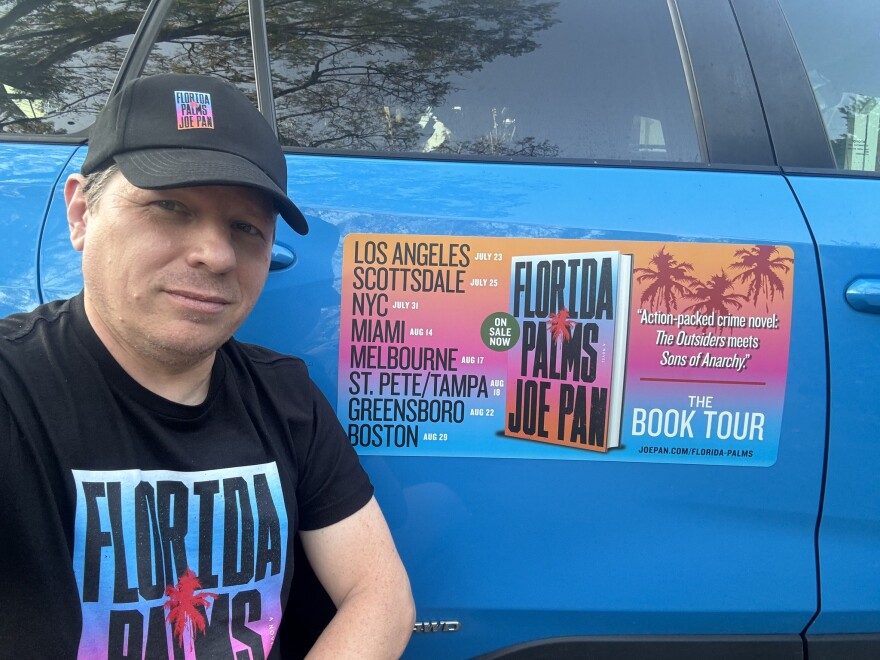It’s 2009, the height of the Great Recession and two friends in central Florida are fresh out of high school.
With the economy in the dumps and options limited, teenagers Eddy and Cueball join a drug-running operation.
That's the storyline of 'Florida Palms,' a new crime thriller by Melbourne native, Joe Pan.
WUSF's Cathy Carter recently spoke with the author about his debut novel.
Joe, your teenage protagonists make some questionable choices, but in many ways, they are victims of circumstance. They didn't choose this life. Eddy and Cueball get pulled into this narcotics gang by Cueball’s biker dad. Eddy’s mom has run off and left him to pay the mortgage. So, how would you describe your story to readers?
So, one of my good friends called this book the "redneck Godfather," which is hilarious, and I really enjoyed that. But go into this book knowing that it's crime fiction that I tried to elevate, that it's going to be a slow burn, that it's really character driven. It has its fast parts. It has its crazy, meaty parts. It has its violence and all the things that people go into thrillers for, but I was looking for a more dynamic way to tell this story that is very real and true to me, which is the story of people struggling in Central Florida.

Your story was partially informed by your own childhood. Growing up in Melbourne, a land of haves and have nots, yes?
The tourism is the number one money maker in my area, outside of the defense industry and the space and aeronautic industry, right? So, people coming down are going to have this sense of it being a lovely vacation spot. When I tell people where the story is set, they are like, ‘oh, I've been to Melbourne, downtown Melbourne is the cutest place, there's this little French bistro I really love there.’ And I don't disagree with them. Those are lovely, lovely things. But as I said in the book, if you walk down this one alley that posts a sign saying that Al Capone shot a game of pool there, if you walk down the alley, and go to the back, you'll see workers throwing dice for food stamps. So, you have to look behind the sheen, the curtain, the veil, to see another part of that.
These characters are trying to survive in a system that has given them very few good options, but you've given them a lot of depth. They're anti-heroes in some ways, because you do kind of root for them to rise above their situation.
I try to show the brutal moral calculations of people under pressure, right, and what it means to do the right thing when there's no clear path. So, what is the right thing for you in those circumstances, when you're facing homelessness, those things break down pretty quickly, especially when there's nobody looking out for you, or it doesn't feel like that. And one of the big themes in this book is, what codes do we live by? And you find that in this group of people, this club, this drug gang, the moral code really has to do with a kind of brotherhood. It's about people sticking together, and so what this group feeds off of is this sense that people need each other, which is really wonderful, and we do. We're social creatures. We need each other, but that can be utilized for nefarious purposes.

There are a lot of stereotypes about Florida in pop culture. How did your experience as a Floridian shape your story?
Well, that's a great question, and Florida can't help but be a character, right? It attacks people with mosquitoes. The rains come, they go. People are hiding out. It's the capital of lightning and UFO sightings, but also the capital of like serial killers, you know? All of these things that feed into that mythos. It interested me in the same way that a lot of these tropes and mythologies interest me, right? You start off from a place of storytelling and then work your way back into the real human element, or at least that's how I see fiction. You give people kind of what they've heard about and what they like, and then you show them the deeper well, and you personalize it. And for me, Florida works as a character in that way, atmosphere and sense of place is really big. Hopefully the audience will sit with the atmosphere of the place that, in fact, builds out a larger superstructure in which to investigate these characters.
Joe Pan will speak at Tombolo Books in St.Petersburg Monday Aug. 18 and at the Safety Harbor Public Library on Tuesday, Aug. 19.




